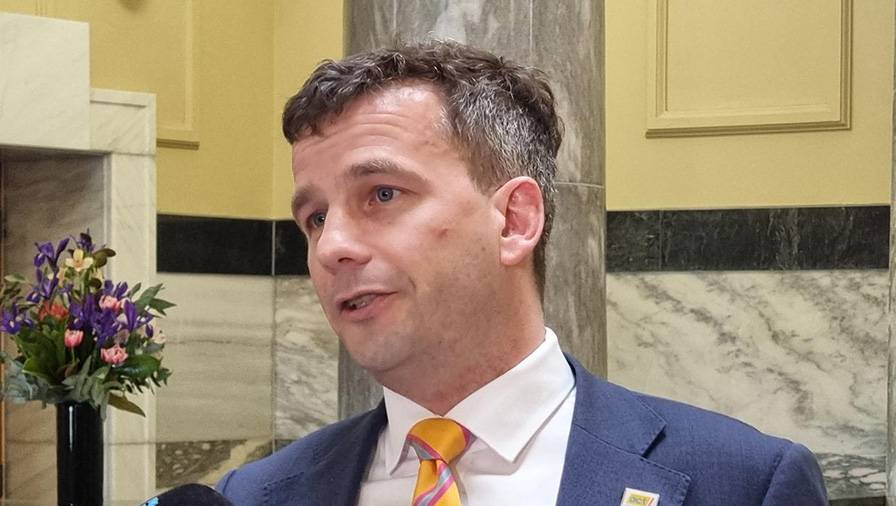Journalism crisis, gang crackdown, housing fix and Māori health
ANALYSIS: New Zealand is not alone as news media comes under pressure.
WATCH: NBR political editor Brent Edwards speaks with Grant Walker.
ANALYSIS: New Zealand is not alone as news media comes under pressure.
WATCH: NBR political editor Brent Edwards speaks with Grant Walker.
The announced demise of Newshub dominated much of the news media this week, with politicians of all stripes weighing in with their concerns about what its closure would mean for democracy.
Once it ends operations as planned at the end of June, TVNZ would be the only significant source of television news, even if the medium is quickly being swamped by technology and changes in viewer preferences. As it is fewer people watch the 6pm news and the flow of viewers away from linear television is only picking up speed as older generations die off.
But the axing of Newshub and the consequent loss of hundreds of jobs is a blow to the news media and – as many rightly point out – will weaken democracy by taking another significant news media player out of operation.
While there is consternation about that a television station is going to be stripped of news, the ongoing hollowing out of journalism is not new.
Go back to the closure of the Auckland Star in the early 1990s, the Evening Post in 2002, the Christchurch Star being turned into a community paper or the ongoing reduction in the reach of provincial newspapers and it is easy to see how democracy has been undermined over many years as sources of journalism have shrunk under the combination of commercial pressures and technology changes, principally the explosion of social media.
No large media organisation has yet worked out how to not just survive, but thrive, in this new environment.
Most have made huge mistakes by chasing clickbait news and investing in ‘celebrity’ journalism where sometimes opinion is rated more highly than the facts. But whatever the criticism of journalism over the past 30 years or so it has still played an important role in keeping citizens informed and holding those in power to account.

Newshub staff were shocked by the announcement the news operation will close down in June.
NBR presenter Grant Walker asks what the latest bad news announcement says about the state of the news media.
It confirms it remains in a state of crisis and that there are no easy solutions to the challenges it faces. Warner Brothers Discovery, which owns Newshub, has not asked for government help nor has the Government offered it.
Previous initiatives to help support New Zealand media – such as the public interest journalism fund – have drawn widespread criticism but particularly from the parties which make up the Coalition Government, who routinely and wrongly accused media of being bribed by the fund to run stories supportive of the former Labour Government.
That Labour Government also introduced legislation aimed at enabling “fair bargaining between New Zealand news media entities and operators of digital platforms to support commercial arrangements for news content”. The Fair Digital News Bargaining Bill is before a select committee but there is no commitment from the Coalition to support it.
Act leader and Associate Finance Minister David Seymour says while the Government will not bail out Newshub he has asked for advice on whether government-owned TVNZ should restart paying a dividend to help level the playing field.
“I think there’s a question mark around whether the Government’s ownership of one TV channel and the poor returns it’s demanded as a shareholder has actually contributed to an uncompetitive market,” RNZ reported Seymour saying.
Maybe, but more worrying for the Government will be the ongoing pressure on TVNZ as it desperately pivots to meet the growing demands of a digital audience. There will surely be lessons for the State-owned television station in what has been happening at Newshub.
There is still hope though that Newshub might not disappear altogether. It is possible it might survive in some slimmed down fashion and still provide a news service of sorts.
But its problems reflect the ongoing challenges news media and journalism here face. Nor is New Zealand alone. News media companies around the world have and are facing the same challenges.

Act leader and Associate Finance Minister David Seymour.
Earlier in the week the Government announced its well-advertised crackdown on gangs, with Justice Minister Paul Goldsmith and Police Minister Mark Mitchell saying they will introduce legislation to ban all gang insignia in public places and give the police greater powers to stop criminal gangs from gathering in groups and communicating.
“Police will be able to issue dispersal notices, which will require gang members to immediately leave an area and not associate with one another for seven days,” they said.
Critics question whether police have the wherewithal to enforce it and question too whether the proposed law will breach the Bill of Rights.
Goldsmith is adamant that even if it breaches the Bill of Rights that would not stop the Government passing the law and enforcing it.
There was a strong political message which came with the announcement and that was that the Coalition Government was tough on crime compared with Labour’s ‘soft on crime’ approach.
And the Government got unexpected help from former Labour police minister Stuart Nash, who told RNZ he had wanted strong seizure powers when he was minister, but had been stopped by other ministers who instead agreed on a $30,000 threshold for the seizure of goods from criminal gangs.

Police Minister Mark Mitchell.
Housing Minister Chris Bishop also announced a series of changes he is working on to fix the broken housing market.
These include requiring councils to have a 30-year plan to zone enough land for housing, making it easier for mixed-use zoning, looking at more flexible ways to fund housing developments and provide incentives for councils to promote housing growth. He said Act’s policy of sharing a percentage of the GST from new housing with councils would be considered as part of the mix.
In effect Bishop is offering councils a carrot to do more to promote housing, but he is also standing over them with a stick if they don’t conform.
And, as the Government continues to tick off initiatives in its 100-day plan legislation, scrapping the Māori Health Authority passed through Parliament, long before the Waitangi Tribunal could hear a complaint into the Government’s plans. There was plenty of criticism of the Government using parliamentary urgency to scrap the authority, with former government minister Peter Dunne writing in his weekly column that it was “unseemly”.
“No matter that the authority’s abolition was an election commitment of all three government coalition partners, and was thus inevitable, the process by which it has been done was messy,” Dunne wrote.
Meanwhile, next week the Government’s first 100 days comes to an end on Friday. Before that deadline Parliament will do the first readings of legislation applying road user charges to light electric vehicles, on firearms, getting tough on gangs, fast-track consenting and repealing the Business Payments Practices Act. It will also pass legislation repealing the Auckland regional fuel tax and removing legal aid funding for a report or statement under section 27 of the Sentencing Act.
Brent Edwards is NBR's political editor.
Sign up to get the latest stories and insights delivered to your inbox – free, every day.